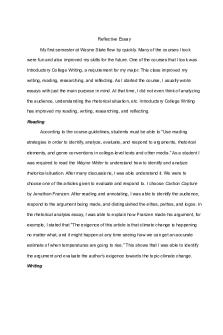Reflective Essay#3 PDF

| Title | Reflective Essay#3 |
|---|---|
| Course | Land Food And Community Ii |
| Institution | The University of British Columbia |
| Pages | 3 |
| File Size | 60.4 KB |
| File Type | |
| Total Downloads | 100 |
| Total Views | 144 |
Summary
.Reflective Essay#3...
Description
From the readings and discussions that have taken place during lectures and tutorials, I have learned that my knowledge on food literacy is under-developed and that I have a lot to learn to enhance my understanding of food literacy. Before coming into the faculty of Land and Food Systems, my choice of diet depended on the taste and cravings rather than the nutritional values of my consumption and I often disregarded the complex system included in creating the product. However, my ideas and ponders were consistently leaning towards food-related issues whether it would be about nutrition, necessities, or global food insecurities. I was always willing to open up and learn about the functional food literacies in depth. There are different dimensions of food literacy, as supported by this saying, “Being able to read a food label is one thing, understanding why McDonalds is so cheap, filling and ubiquitous is another” (Wills, 2009, p. 4). This statement directly explains which dimension of food literacy I was missing. I was able to read food labels right away but was lacking in interactive food literacy, where I have to use the information gained in a meaningful way (Valley & Carrillo, 2017). From high school, I sometimes thought that food and eating was being categorized as just a source of energy and that it often distracts me from studying and steals my time to be educated. Ever since elementary school, eating in class was strictly prohibited and was sometimes used as an excuse for students to escape from studying. However, after coming to university and taking LFS courses, especially LFS 250, my perspective on eating has changed drastically and I value the importance of food consumption and how it affect our daily lives. This learning matters because the understanding of the food system greatly influence our views on what we eat and help us to develop such aspects in a sustainable way. If I only cared about the taste of foods that I consume before taking LFS courses, I now consider what goes into
my body more seriously and contemplate what kind of nutrients I would need to maintain a healthy body. By understanding the social aspects of the food system, it will enhance the society’s choice of food as it will not only be seen as a necessity to live, but as an important factor that impact our bodies directly. Also, it will be easier for us to reach the goals of on-going issues involving food security and food sovereignty as we will be able to understand where such problems initially come from. In our current society however, I am starting to notice an increased amount of people who are informed about food-related decisions and are very supportive towards sustainable lifestyles. For instance, increasing the use of personal cups, plant-based diets, following Canada’s food guide, eating more greens, etc., are all spreading awareness in food-related topics and encourages our society to foster a healthy relationship with food. I hope that this continues to create constructive awareness and bring positive change to our food system, whether it would be individually or federally. In light of this learning, I will motivate myself to make better choices relating to food and think about how my choices can impact the food system as a whole. Through continuous research and learnings made through the faculty of Land and Food Systems, I want to be a part of intensifying food literacy skills and knowledge. By creating these ideas and programs, we will be able to easily navigate the inputs and outputs of the food system to our future generations and support the enhancement to achieve our goals containing food wellness in the future.
Valley, W., & Carrillo, J. (2017). Session 23 – Food System Literacy. Retrieved from Session Notes LFS 250 Website: https://lfs250.landfood.ubc.ca/term-2-session-notes/session-25-food-systemsliteracy/ Wills, J. (2009). Health literacy: new packaging for health education or radical movement? International Journal of Public Health, 54(1), 3–4....
Similar Free PDFs

Reflective Essay
- 5 Pages

Reflective Essay
- 4 Pages

Reflective Journal
- 3 Pages

Reflective Essay
- 5 Pages

Reflective Essay
- 1 Pages

Reflective Essay
- 5 Pages

Reflective Essay
- 2 Pages

Reflective analysis
- 5 Pages

Reflective Report
- 3 Pages

Reflective Essay - Barbie Doll
- 3 Pages

Reflective Commentary Guidelines
- 1 Pages

Reflective Journal Example 1
- 2 Pages

Radio Reflective Essay
- 2 Pages

Reflective analysis - Grade: A
- 5 Pages

Reflective Commentary Essay
- 3 Pages

Reflective Essay - Grade: B
- 4 Pages
Popular Institutions
- Tinajero National High School - Annex
- Politeknik Caltex Riau
- Yokohama City University
- SGT University
- University of Al-Qadisiyah
- Divine Word College of Vigan
- Techniek College Rotterdam
- Universidade de Santiago
- Universiti Teknologi MARA Cawangan Johor Kampus Pasir Gudang
- Poltekkes Kemenkes Yogyakarta
- Baguio City National High School
- Colegio san marcos
- preparatoria uno
- Centro de Bachillerato Tecnológico Industrial y de Servicios No. 107
- Dalian Maritime University
- Quang Trung Secondary School
- Colegio Tecnológico en Informática
- Corporación Regional de Educación Superior
- Grupo CEDVA
- Dar Al Uloom University
- Centro de Estudios Preuniversitarios de la Universidad Nacional de Ingeniería
- 上智大学
- Aakash International School, Nuna Majara
- San Felipe Neri Catholic School
- Kang Chiao International School - New Taipei City
- Misamis Occidental National High School
- Institución Educativa Escuela Normal Juan Ladrilleros
- Kolehiyo ng Pantukan
- Batanes State College
- Instituto Continental
- Sekolah Menengah Kejuruan Kesehatan Kaltara (Tarakan)
- Colegio de La Inmaculada Concepcion - Cebu